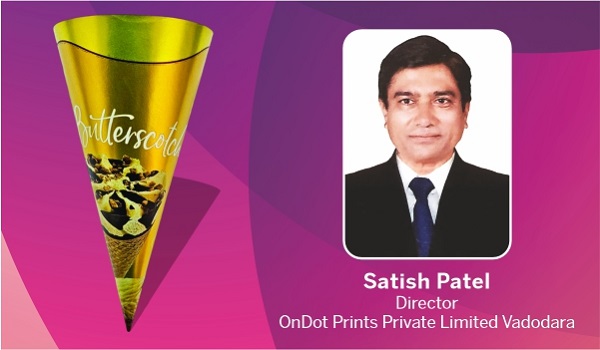Ice cream cone sleeves are more than just a protective layer for your favourite frozen treat—they play a crucial role in branding, presentation, and overall customer experience. In this article, we will explore the technical aspects, quality parameters, and impact of ice cream cone sleeves on saleability, including the importance of precise printing.
MATERIAL COMPOSITION
Paperboard:
Most cone sleeves are made from paper-foil lamination, which offers a good balance of strength and printability. It works out to be cost-effective.
Plastic Coatings:
Some sleeves feature a plastic coating or lamination to make them moisture-resistant and to enhance durability. This is particularly important for maintaining the integrity of the sleeve during the consumption of the ice cream.
Biodegradable Materials:
With increasing environmental awareness, there is a growing trend towards using biodegradable or compostable materials for ice cream cone sleeves. These materials often include plant-based fibers or compostable plastics.
DESIGN & STRUCTURE
Form-Fitting Design:
Sleeves are designed to snugly fit various sizes and types of cones, ensuring a secure grip and optimal insulation.
Ventilation:
Some advanced designs include perforations or ventilation holes to help prevent condensation and maintain the cone’s crispness.
PRINTING TECHNOLOGY
Flexographic Printing:
This common printing method involves transferring ink from a raised surface to the sleeve. It is efficient for large volumes and provides good colour accuracy.
Offset Printing:
Known for its high-quality results, offset printing uses a different process to transfer ink and is ideal for detailed graphics and text.
Digital Printing:
This modern technique allows for high-resolution, full-colour prints and is suitable for short runs or customized designs.
DURABILITY & STRENGTH
Tensile Strength:
The sleeve should be strong enough to withstand handling without tearing or losing its shape.
Moisture Resistance:
A quality sleeve should resist moisture from the ice cream and any condensation to prevent it from becoming soggy.
PRINT QUALITY
Colour Consistency:
High-quality printing ensures that colours are vibrant and consistent across all sleeves.
Image Clarity:
Clear, sharp images and text are crucial for effective branding and consumer appeal.
SAFETY & HYEGIENE
Food-Safe Materials:
The materials used must be compliant with food safety regulations to ensure they do not contaminate the ice cream.
Seam Integrity:
Proper sealing and construction prevent any potential exposure of the cone to external contaminants.
BRAND IMPACT & SEALLABILITY
Visual Appeal:
Attractive, well-designed sleeves catch the eye of consumers, making the product stand out in a crowded market.
Brand Recognition:
Consistent branding on the sleeves can help build brand loyalty and recognition.
Ease of Handling:
A well-designed sleeve improves the consumer’s experience by making the cone easier to hold and reducing mess.
Perceived Quality:
High-quality sleeves convey a sense of premium quality, potentially enhancing the perceived value of the ice cream.
Eco-Friendly Options:
Offering sleeves made from sustainable materials can appeal to environmentally conscious consumers and differentiate the product in the marketplace.
In nut-shell
Ice cream cone sleeves are a vital component in the ice cream industry, impacting not only the practical aspects of handling and consumption but also playing a significant role in branding and consumer perception.
By focusing on technical aspects such as material composition and printing methods, maintaining high-quality standards, and understanding their influence on saleability, manufacturers can create effective and attractive sleeves that enhance the overall product experience.
Whether you are considering custom designs or exploring sustainable materials, understanding these elements will help you make informed decisions and create a product that stands out in the competitive ice cream market


